Session 8 Reflective Journal: Ethical Behavior in the Workplace
VerifiedAdded on 2023/03/23
|6
|1351
|37
Journal and Reflective Writing
AI Summary
This reflective journal entry explores the critical role of ethical behavior in the workplace. The author emphasizes that moral conduct is essential for employees, fostering partnerships, guiding work performance, and setting clear standards. The journal discusses the importance of ethical behavior for building trust, ensuring customer confidence, and establishing a positive organizational culture. It highlights various aspects of ethical communication, the impact of moral principles on preventing issues like torture and segregation, and the benefits of having moral representatives. The author also examines how ethical behavior can enhance team dynamics, build confidence, and lead to improved individual and organizational outcomes, ultimately promoting a more positive and productive work environment. The importance of maintaining high ethical standards is also discussed to create a more trusting environment.
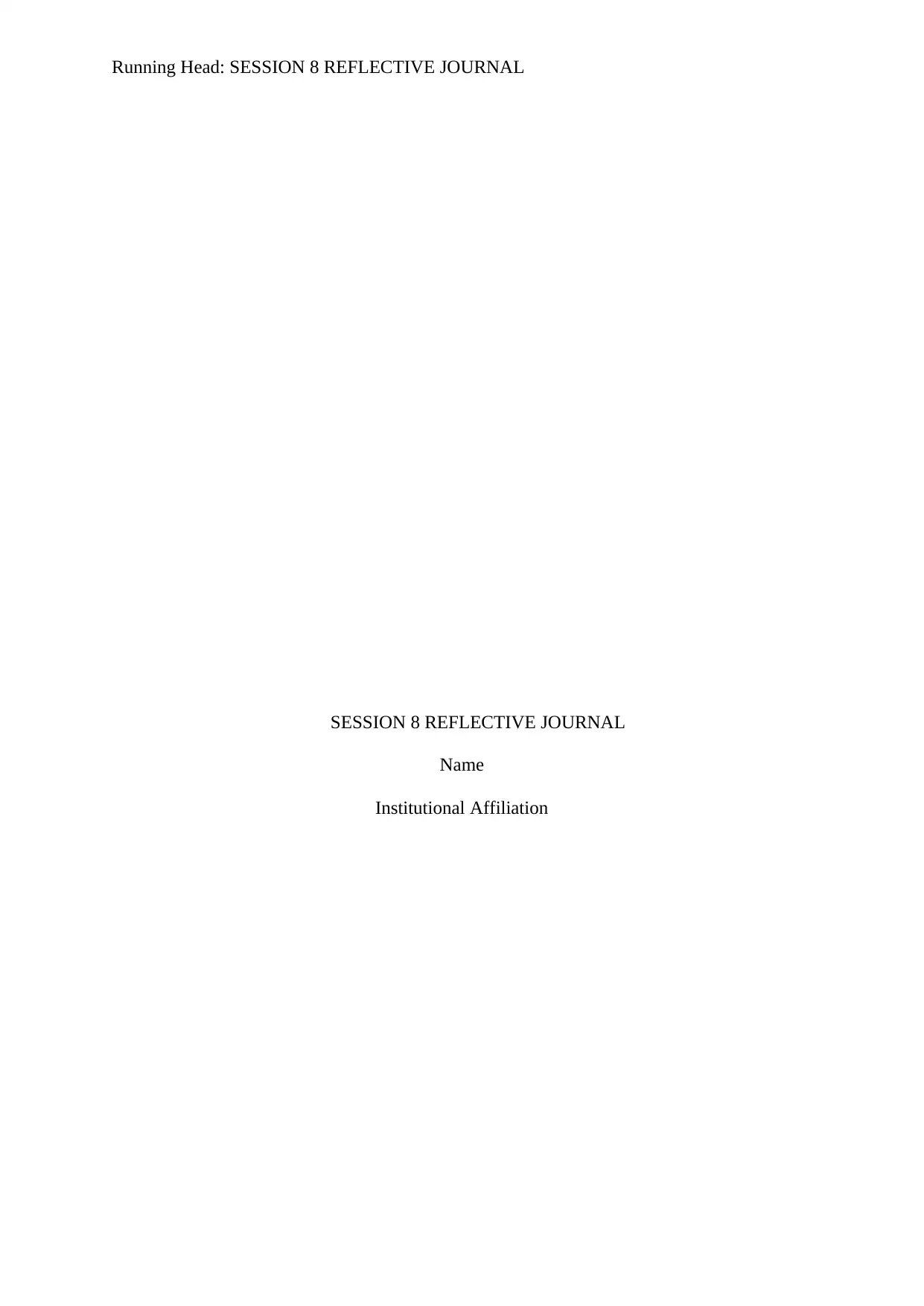
Running Head: SESSION 8 REFLECTIVE JOURNAL
SESSION 8 REFLECTIVE JOURNAL
Name
Institutional Affiliation
SESSION 8 REFLECTIVE JOURNAL
Name
Institutional Affiliation
Paraphrase This Document
Need a fresh take? Get an instant paraphrase of this document with our AI Paraphraser
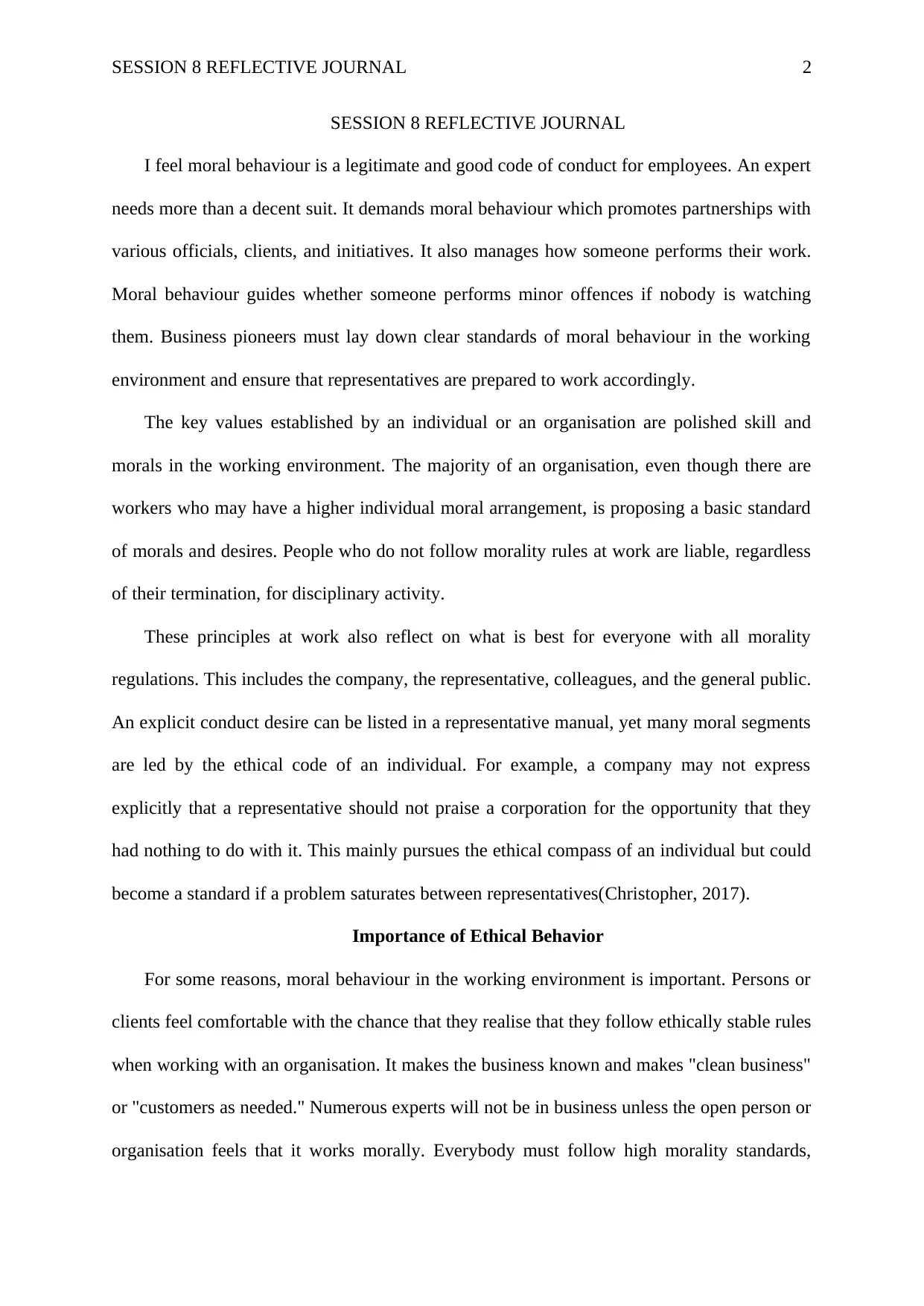
SESSION 8 REFLECTIVE JOURNAL 2
SESSION 8 REFLECTIVE JOURNAL
I feel moral behaviour is a legitimate and good code of conduct for employees. An expert
needs more than a decent suit. It demands moral behaviour which promotes partnerships with
various officials, clients, and initiatives. It also manages how someone performs their work.
Moral behaviour guides whether someone performs minor offences if nobody is watching
them. Business pioneers must lay down clear standards of moral behaviour in the working
environment and ensure that representatives are prepared to work accordingly.
The key values established by an individual or an organisation are polished skill and
morals in the working environment. The majority of an organisation, even though there are
workers who may have a higher individual moral arrangement, is proposing a basic standard
of morals and desires. People who do not follow morality rules at work are liable, regardless
of their termination, for disciplinary activity.
These principles at work also reflect on what is best for everyone with all morality
regulations. This includes the company, the representative, colleagues, and the general public.
An explicit conduct desire can be listed in a representative manual, yet many moral segments
are led by the ethical code of an individual. For example, a company may not express
explicitly that a representative should not praise a corporation for the opportunity that they
had nothing to do with it. This mainly pursues the ethical compass of an individual but could
become a standard if a problem saturates between representatives(Christopher, 2017).
Importance of Ethical Behavior
For some reasons, moral behaviour in the working environment is important. Persons or
clients feel comfortable with the chance that they realise that they follow ethically stable rules
when working with an organisation. It makes the business known and makes "clean business"
or "customers as needed." Numerous experts will not be in business unless the open person or
organisation feels that it works morally. Everybody must follow high morality standards,
SESSION 8 REFLECTIVE JOURNAL
I feel moral behaviour is a legitimate and good code of conduct for employees. An expert
needs more than a decent suit. It demands moral behaviour which promotes partnerships with
various officials, clients, and initiatives. It also manages how someone performs their work.
Moral behaviour guides whether someone performs minor offences if nobody is watching
them. Business pioneers must lay down clear standards of moral behaviour in the working
environment and ensure that representatives are prepared to work accordingly.
The key values established by an individual or an organisation are polished skill and
morals in the working environment. The majority of an organisation, even though there are
workers who may have a higher individual moral arrangement, is proposing a basic standard
of morals and desires. People who do not follow morality rules at work are liable, regardless
of their termination, for disciplinary activity.
These principles at work also reflect on what is best for everyone with all morality
regulations. This includes the company, the representative, colleagues, and the general public.
An explicit conduct desire can be listed in a representative manual, yet many moral segments
are led by the ethical code of an individual. For example, a company may not express
explicitly that a representative should not praise a corporation for the opportunity that they
had nothing to do with it. This mainly pursues the ethical compass of an individual but could
become a standard if a problem saturates between representatives(Christopher, 2017).
Importance of Ethical Behavior
For some reasons, moral behaviour in the working environment is important. Persons or
clients feel comfortable with the chance that they realise that they follow ethically stable rules
when working with an organisation. It makes the business known and makes "clean business"
or "customers as needed." Numerous experts will not be in business unless the open person or
organisation feels that it works morally. Everybody must follow high morality standards,
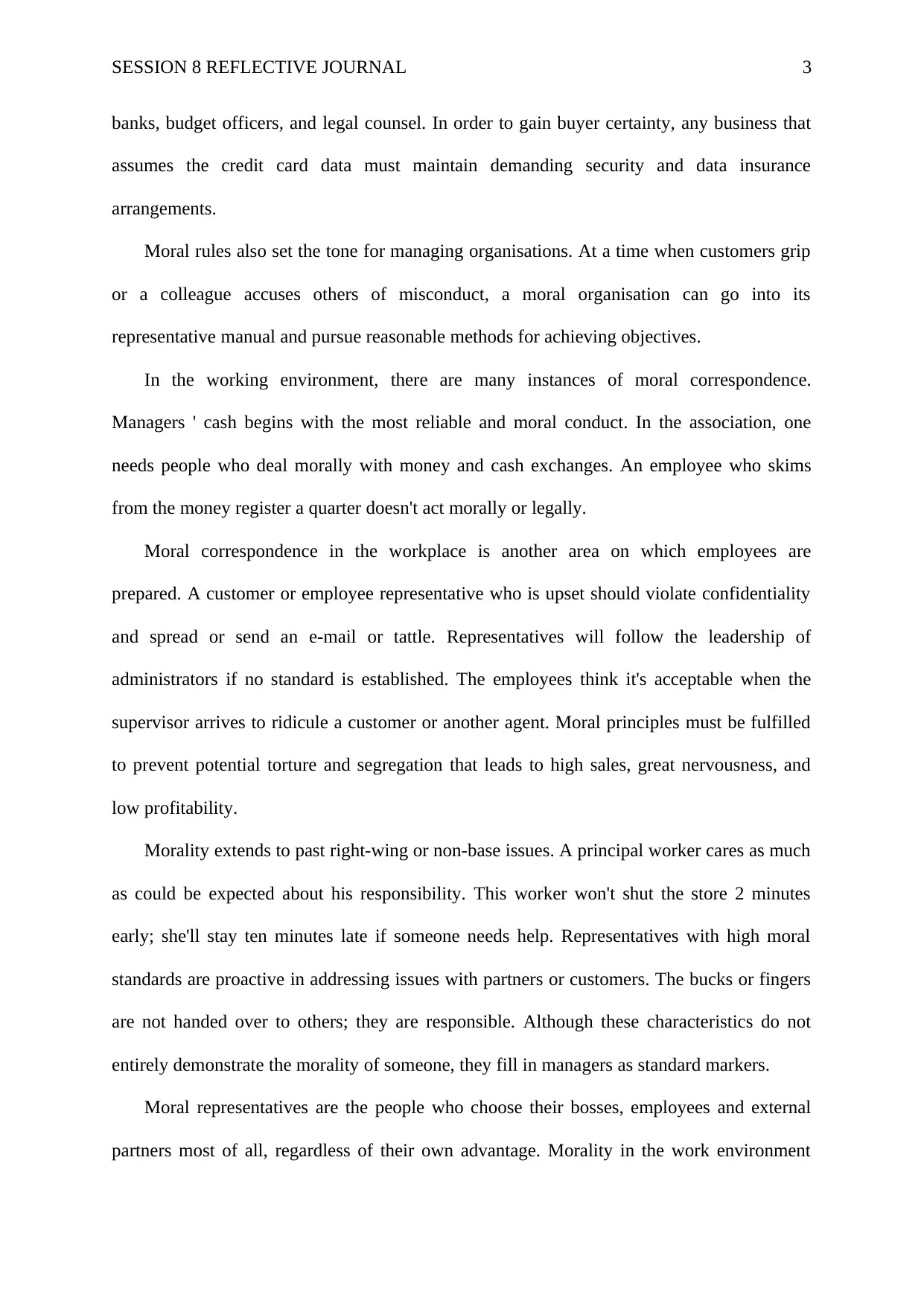
SESSION 8 REFLECTIVE JOURNAL 3
banks, budget officers, and legal counsel. In order to gain buyer certainty, any business that
assumes the credit card data must maintain demanding security and data insurance
arrangements.
Moral rules also set the tone for managing organisations. At a time when customers grip
or a colleague accuses others of misconduct, a moral organisation can go into its
representative manual and pursue reasonable methods for achieving objectives.
In the working environment, there are many instances of moral correspondence.
Managers ' cash begins with the most reliable and moral conduct. In the association, one
needs people who deal morally with money and cash exchanges. An employee who skims
from the money register a quarter doesn't act morally or legally.
Moral correspondence in the workplace is another area on which employees are
prepared. A customer or employee representative who is upset should violate confidentiality
and spread or send an e-mail or tattle. Representatives will follow the leadership of
administrators if no standard is established. The employees think it's acceptable when the
supervisor arrives to ridicule a customer or another agent. Moral principles must be fulfilled
to prevent potential torture and segregation that leads to high sales, great nervousness, and
low profitability.
Morality extends to past right-wing or non-base issues. A principal worker cares as much
as could be expected about his responsibility. This worker won't shut the store 2 minutes
early; she'll stay ten minutes late if someone needs help. Representatives with high moral
standards are proactive in addressing issues with partners or customers. The bucks or fingers
are not handed over to others; they are responsible. Although these characteristics do not
entirely demonstrate the morality of someone, they fill in managers as standard markers.
Moral representatives are the people who choose their bosses, employees and external
partners most of all, regardless of their own advantage. Morality in the work environment
banks, budget officers, and legal counsel. In order to gain buyer certainty, any business that
assumes the credit card data must maintain demanding security and data insurance
arrangements.
Moral rules also set the tone for managing organisations. At a time when customers grip
or a colleague accuses others of misconduct, a moral organisation can go into its
representative manual and pursue reasonable methods for achieving objectives.
In the working environment, there are many instances of moral correspondence.
Managers ' cash begins with the most reliable and moral conduct. In the association, one
needs people who deal morally with money and cash exchanges. An employee who skims
from the money register a quarter doesn't act morally or legally.
Moral correspondence in the workplace is another area on which employees are
prepared. A customer or employee representative who is upset should violate confidentiality
and spread or send an e-mail or tattle. Representatives will follow the leadership of
administrators if no standard is established. The employees think it's acceptable when the
supervisor arrives to ridicule a customer or another agent. Moral principles must be fulfilled
to prevent potential torture and segregation that leads to high sales, great nervousness, and
low profitability.
Morality extends to past right-wing or non-base issues. A principal worker cares as much
as could be expected about his responsibility. This worker won't shut the store 2 minutes
early; she'll stay ten minutes late if someone needs help. Representatives with high moral
standards are proactive in addressing issues with partners or customers. The bucks or fingers
are not handed over to others; they are responsible. Although these characteristics do not
entirely demonstrate the morality of someone, they fill in managers as standard markers.
Moral representatives are the people who choose their bosses, employees and external
partners most of all, regardless of their own advantage. Morality in the work environment
⊘ This is a preview!⊘
Do you want full access?
Subscribe today to unlock all pages.

Trusted by 1+ million students worldwide
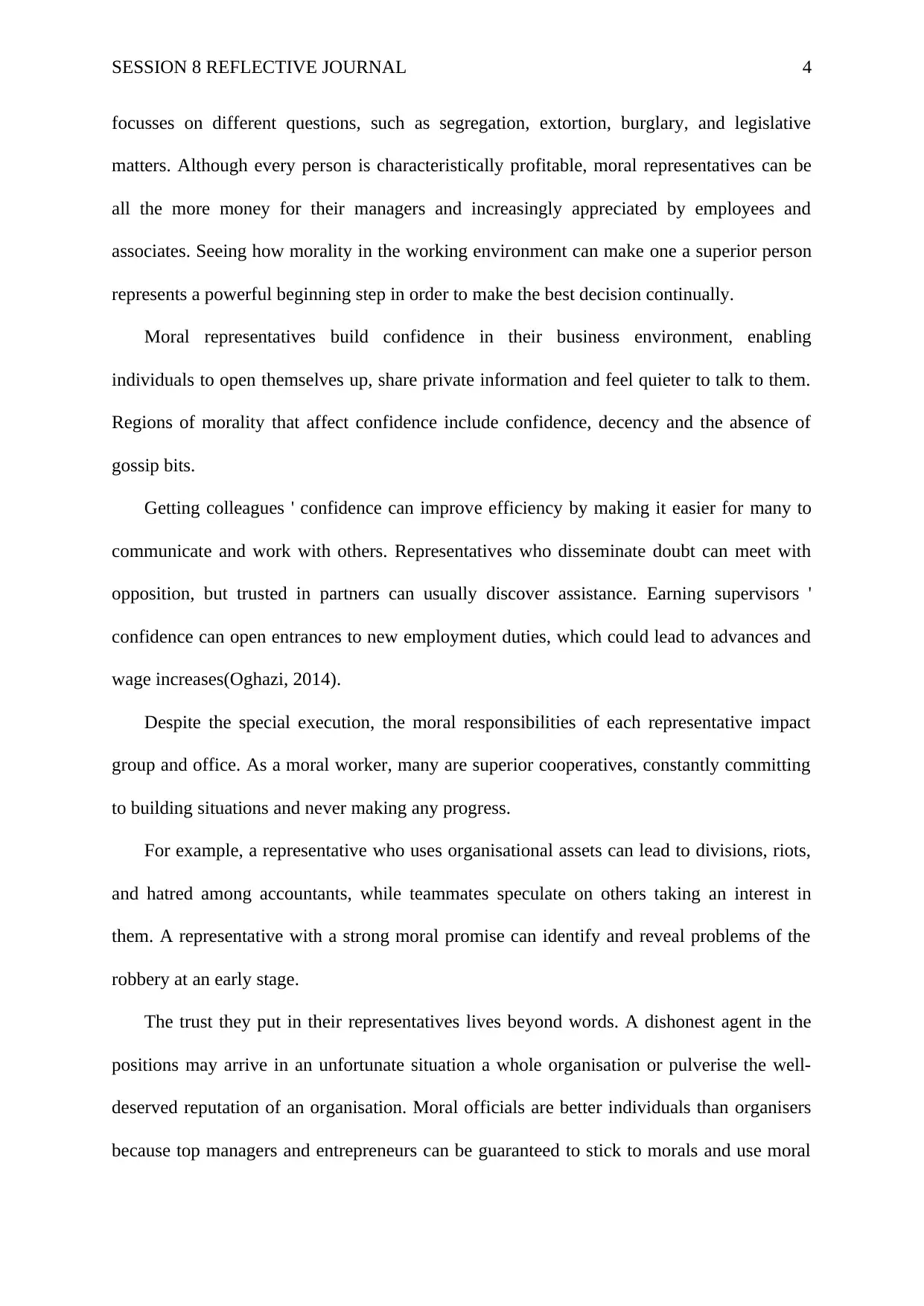
SESSION 8 REFLECTIVE JOURNAL 4
focusses on different questions, such as segregation, extortion, burglary, and legislative
matters. Although every person is characteristically profitable, moral representatives can be
all the more money for their managers and increasingly appreciated by employees and
associates. Seeing how morality in the working environment can make one a superior person
represents a powerful beginning step in order to make the best decision continually.
Moral representatives build confidence in their business environment, enabling
individuals to open themselves up, share private information and feel quieter to talk to them.
Regions of morality that affect confidence include confidence, decency and the absence of
gossip bits.
Getting colleagues ' confidence can improve efficiency by making it easier for many to
communicate and work with others. Representatives who disseminate doubt can meet with
opposition, but trusted in partners can usually discover assistance. Earning supervisors '
confidence can open entrances to new employment duties, which could lead to advances and
wage increases(Oghazi, 2014).
Despite the special execution, the moral responsibilities of each representative impact
group and office. As a moral worker, many are superior cooperatives, constantly committing
to building situations and never making any progress.
For example, a representative who uses organisational assets can lead to divisions, riots,
and hatred among accountants, while teammates speculate on others taking an interest in
them. A representative with a strong moral promise can identify and reveal problems of the
robbery at an early stage.
The trust they put in their representatives lives beyond words. A dishonest agent in the
positions may arrive in an unfortunate situation a whole organisation or pulverise the well-
deserved reputation of an organisation. Moral officials are better individuals than organisers
because top managers and entrepreneurs can be guaranteed to stick to morals and use moral
focusses on different questions, such as segregation, extortion, burglary, and legislative
matters. Although every person is characteristically profitable, moral representatives can be
all the more money for their managers and increasingly appreciated by employees and
associates. Seeing how morality in the working environment can make one a superior person
represents a powerful beginning step in order to make the best decision continually.
Moral representatives build confidence in their business environment, enabling
individuals to open themselves up, share private information and feel quieter to talk to them.
Regions of morality that affect confidence include confidence, decency and the absence of
gossip bits.
Getting colleagues ' confidence can improve efficiency by making it easier for many to
communicate and work with others. Representatives who disseminate doubt can meet with
opposition, but trusted in partners can usually discover assistance. Earning supervisors '
confidence can open entrances to new employment duties, which could lead to advances and
wage increases(Oghazi, 2014).
Despite the special execution, the moral responsibilities of each representative impact
group and office. As a moral worker, many are superior cooperatives, constantly committing
to building situations and never making any progress.
For example, a representative who uses organisational assets can lead to divisions, riots,
and hatred among accountants, while teammates speculate on others taking an interest in
them. A representative with a strong moral promise can identify and reveal problems of the
robbery at an early stage.
The trust they put in their representatives lives beyond words. A dishonest agent in the
positions may arrive in an unfortunate situation a whole organisation or pulverise the well-
deserved reputation of an organisation. Moral officials are better individuals than organisers
because top managers and entrepreneurs can be guaranteed to stick to morals and use moral
Paraphrase This Document
Need a fresh take? Get an instant paraphrase of this document with our AI Paraphraser
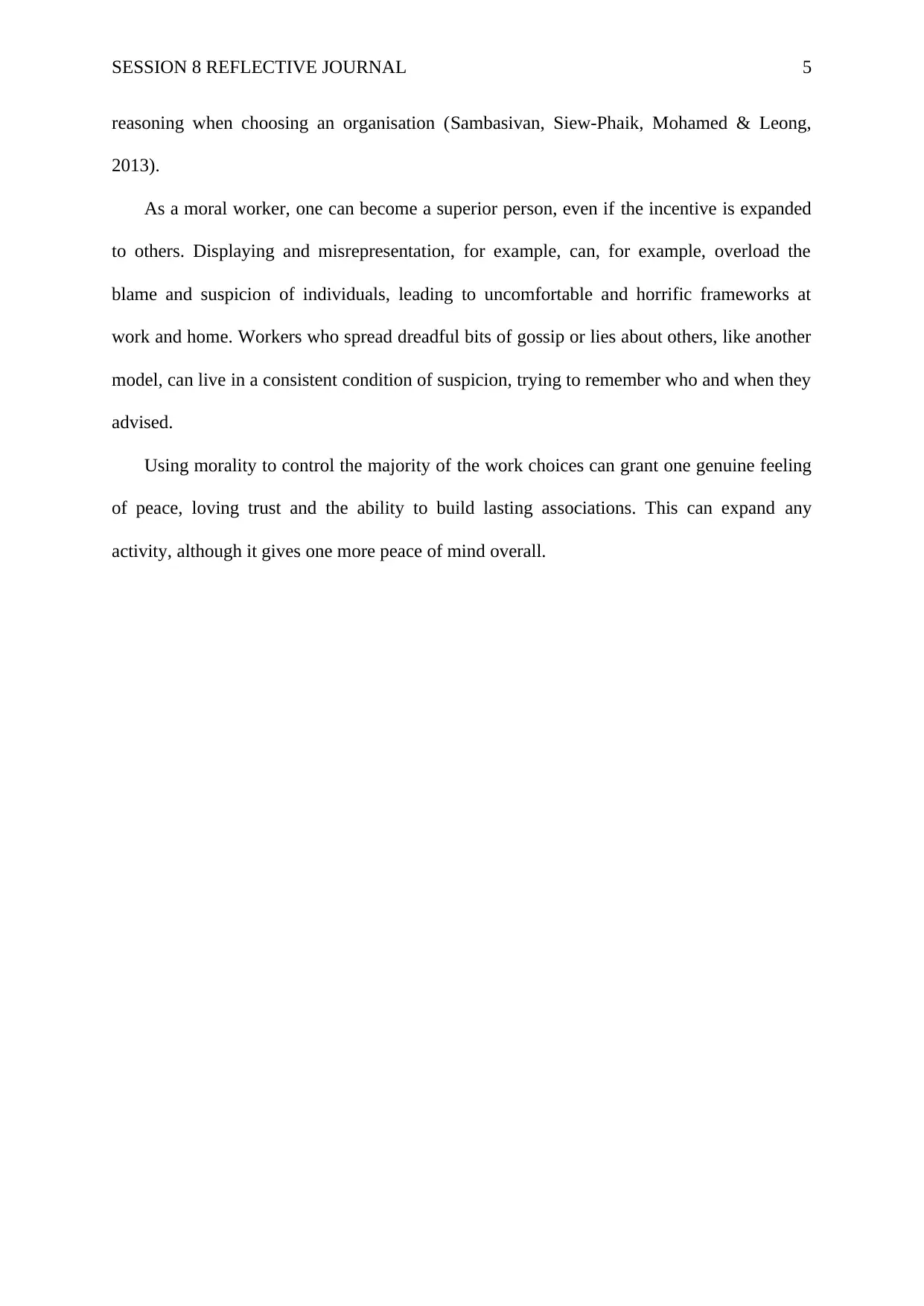
SESSION 8 REFLECTIVE JOURNAL 5
reasoning when choosing an organisation (Sambasivan, Siew-Phaik, Mohamed & Leong,
2013).
As a moral worker, one can become a superior person, even if the incentive is expanded
to others. Displaying and misrepresentation, for example, can, for example, overload the
blame and suspicion of individuals, leading to uncomfortable and horrific frameworks at
work and home. Workers who spread dreadful bits of gossip or lies about others, like another
model, can live in a consistent condition of suspicion, trying to remember who and when they
advised.
Using morality to control the majority of the work choices can grant one genuine feeling
of peace, loving trust and the ability to build lasting associations. This can expand any
activity, although it gives one more peace of mind overall.
reasoning when choosing an organisation (Sambasivan, Siew-Phaik, Mohamed & Leong,
2013).
As a moral worker, one can become a superior person, even if the incentive is expanded
to others. Displaying and misrepresentation, for example, can, for example, overload the
blame and suspicion of individuals, leading to uncomfortable and horrific frameworks at
work and home. Workers who spread dreadful bits of gossip or lies about others, like another
model, can live in a consistent condition of suspicion, trying to remember who and when they
advised.
Using morality to control the majority of the work choices can grant one genuine feeling
of peace, loving trust and the ability to build lasting associations. This can expand any
activity, although it gives one more peace of mind overall.
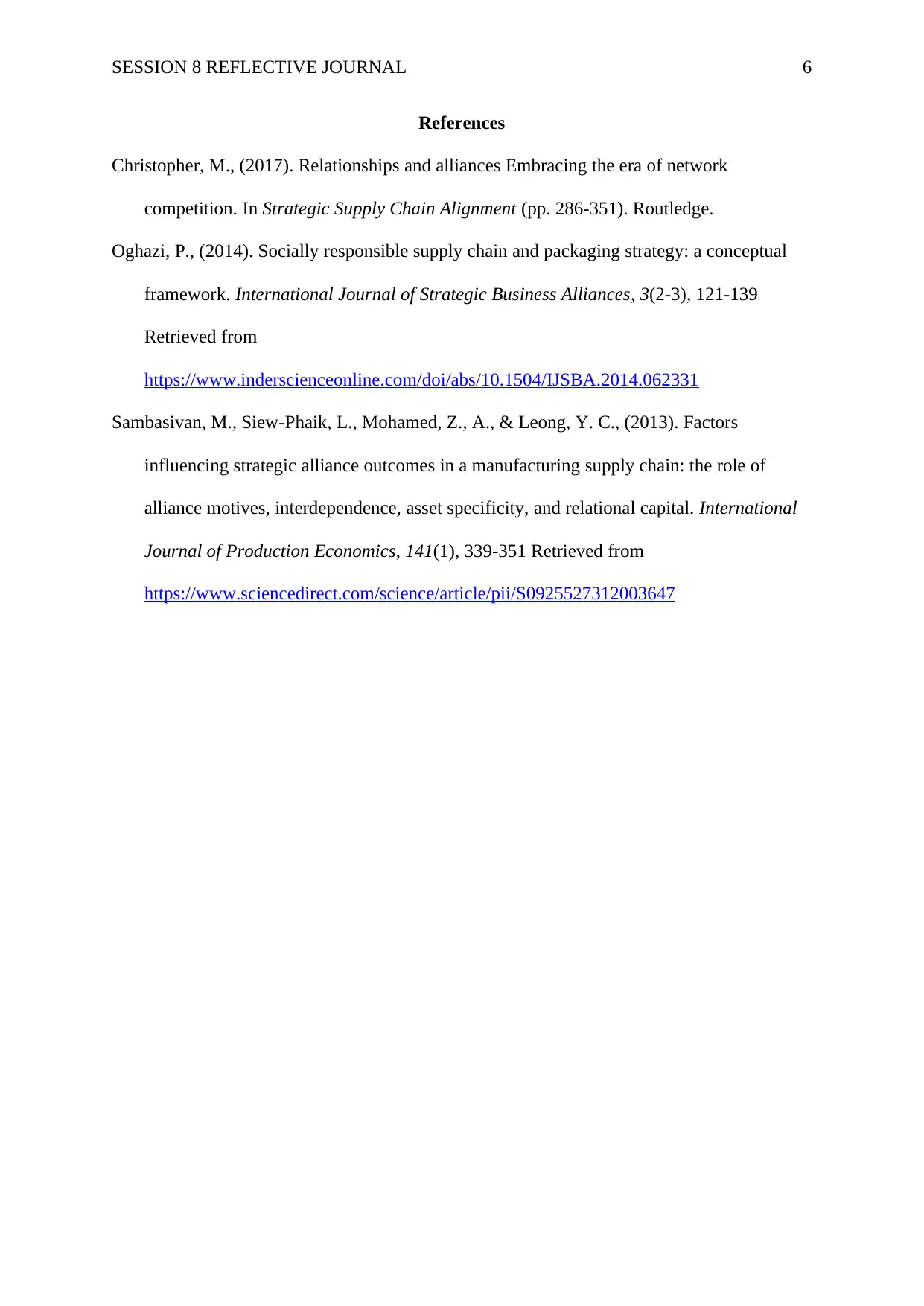
SESSION 8 REFLECTIVE JOURNAL 6
References
Christopher, M., (2017). Relationships and alliances Embracing the era of network
competition. In Strategic Supply Chain Alignment (pp. 286-351). Routledge.
Oghazi, P., (2014). Socially responsible supply chain and packaging strategy: a conceptual
framework. International Journal of Strategic Business Alliances, 3(2-3), 121-139
Retrieved from
https://www.inderscienceonline.com/doi/abs/10.1504/IJSBA.2014.062331
Sambasivan, M., Siew-Phaik, L., Mohamed, Z., A., & Leong, Y. C., (2013). Factors
influencing strategic alliance outcomes in a manufacturing supply chain: the role of
alliance motives, interdependence, asset specificity, and relational capital. International
Journal of Production Economics, 141(1), 339-351 Retrieved from
https://www.sciencedirect.com/science/article/pii/S0925527312003647
References
Christopher, M., (2017). Relationships and alliances Embracing the era of network
competition. In Strategic Supply Chain Alignment (pp. 286-351). Routledge.
Oghazi, P., (2014). Socially responsible supply chain and packaging strategy: a conceptual
framework. International Journal of Strategic Business Alliances, 3(2-3), 121-139
Retrieved from
https://www.inderscienceonline.com/doi/abs/10.1504/IJSBA.2014.062331
Sambasivan, M., Siew-Phaik, L., Mohamed, Z., A., & Leong, Y. C., (2013). Factors
influencing strategic alliance outcomes in a manufacturing supply chain: the role of
alliance motives, interdependence, asset specificity, and relational capital. International
Journal of Production Economics, 141(1), 339-351 Retrieved from
https://www.sciencedirect.com/science/article/pii/S0925527312003647
⊘ This is a preview!⊘
Do you want full access?
Subscribe today to unlock all pages.

Trusted by 1+ million students worldwide
1 out of 6
Related Documents
Your All-in-One AI-Powered Toolkit for Academic Success.
+13062052269
info@desklib.com
Available 24*7 on WhatsApp / Email
![[object Object]](/_next/static/media/star-bottom.7253800d.svg)
Unlock your academic potential
Copyright © 2020–2026 A2Z Services. All Rights Reserved. Developed and managed by ZUCOL.





